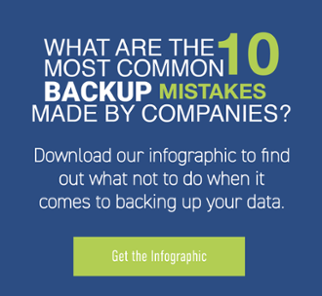
Great CFOs are strategic thinkers. They plan for cash flow, defend profit and weigh financial risks. Great CFOs look into the future and ask themselves, “what if?” What if something bad happens? Fire, flood, cyberattack?
Disasters have one common downside besides the obvious: they put the company’s data at risk. Great CFOs are deeply concerned with preserving the company’s data because in the case of a serious event, replacing hardware and software is fairly easy and more likely than not covered by insurance. However, insurance claims cannot replace company data; it is one of a kind, proprietary and very difficult, if not impossible to replace.
Data backup is more than just making extra copies of your files. It is a complex process that if not managed well can breakdown, leaving a business unprotected. In the early days, companies backed up all of their data to tape, often at the end of each day. If they were smart they stored the tape copies at a safe, off site location. Often, backups were managed by the office manager or another employee as an additional duty and was very much thought of as a nuisance and distraction from their ‘real job.’
Today, companies are generating data faster than ever and multi-media files, such as video, audio and pictures are enormous. It is not unusual for a company to generate and backup terra bytes of data. As companies become more complex, with remote workers, multiple offices and various devices, the process becomes difficult to manage. And to add another layer of complexity many of the devices will use different operating systems and versions of operating systems. It is very common for some backups to fail and for unmanaged backups to have devices that are not backed up for weeks and months at a time. It is not a process that can be managed well by an amateur.
Data backups in a complex environment require sophisticated software and deep technical knowledge. It is not a DIY process. The stakes are high in the event of a real disaster and too much can go wrong. Smart CFOs are hesitant to allow the process to be managed by someone who is not a technology professional as a part time additional duty. The risk to the company is just too high.
The news is full of stories of companies that did not have working backups and were then hit with a ransomware attack, locking all of their files. Many versions of ransomware, such as the Cryptolocker and WannaCry viruses have been detected in the market place. They cost companies worldwide billions of dollars to get their files unlocked, not to mention the cost of lost productivity. Verified backups of company data, is protection against ransomware. They corrupt files can be deleted and uninfected files from the backups restored to use.
Professional management of data backups is cost effective. A professional can troubleshoot issues in a fraction of the time of someone trying to figure it out on the fly because they have deep expertise and experience that improves their efficiency. A professionals’ experience will help them anticipate problems before they grow into a substantial issue.
In an uncertain world, why assume unnecessary risk?
